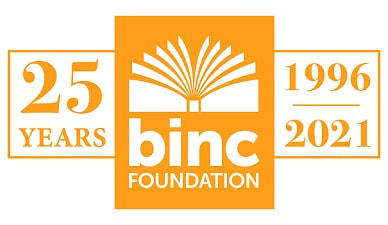BINC Foundation: Helping Booksellers in Hard Times
Founded in 1996, what is now known as the Book Industry Charitable Foundation (BINC for short), was originally known as Borders Group Foundation and was born from the altruism of Borders employees who wanted to help a co-worker who had fallen on hard times. A collection was raised to assist the co-worker and when more funds were raised than needed, the employees realized they had resources that could help other employees in need. With the help of corporate headquarters, a 501(c)3 nonprofit was established and the foundation was officially formed.
“It was this wonderful community, sort of a family foundation. You were taking care of people that you knew – your colleagues,” says Kit Steinaway, one of two program directors at BINC. Kit has been working at BINC since 2007 and has the wonderful fortune of making a career out of helping booksellers in need.
Borders Group Foundation got its funding through donations from Borders’ executives, vendors and publishers, and employees themselves, who could contribute money from their paychecks. Borders matched 50 cents to every dollar donated by employees, and the funds helped colleagues who found themselves struggling with financial hardships, whether from medical expenses, job loss, injury, or other unforeseen circumstances.
When Borders closed permanently in 2011, the foundation found itself with significant funds and no employees to assist. “The decision was made to continue and see if the need that we saw within the Borders employee population would be the same in the larger bookstore population,” says Kit. Because the foundation was fortunate to have what they referred to as ‘legacy funds’ from their time as Borders Group Foundation, the newly formed BINC was able to focus primarily on bringing awareness nationally to the resource they could be to booksellers in need. “For the first three years we were just introducing ourselves, and helping as many people as possible.”
In its original incarnation assisting Borders employees, the foundation also offered higher education scholarships. Because BINC now offers assistance to all booksellers nationally, over the last few years they have begun transitioning to professional development scholarships instead. These types of scholarships allow front-line booksellers opportunities to enhance their education within the book industry and help them make a career out of bookselling.
Fortunately, BINC has done well bringing awareness to itself over the past ten years and receives funding from authors, publishers, distributors, bookstore owners, and employees, and a variety of individual donors. And in true Borders fashion, some bookstores have even set up employee payroll deduction programs so employees can contribute to BINC, and some bookstores even match employee contributions. And when the pandemic began last March, these donors knew their financial help was needed more than ever.
“The publishers stood up, the authors stood up. It’s a community and everyone came together and said, ‘We have to save these bookstores, we have to keep these people in their bookstores. How can we help?’”
The donors were right. In early March, bookseller needs increased dramatically. Pre-pandemic, a normal week would typically consist of two requests a week. At its peak in early April, BINC was receiving requests from booksellers every 15 minutes. Though they had already posted their application online to simplify things, the application process had to be further streamlined–focusing solely on those who couldn’t pay their rent or utilities–and three volunteers brought in to help process all the requests so checks could be distributed promptly. Their first request related to COVID-19 was received on March 12th, and the first batch of checks went out on March 24th. From that day on through early summer, 50-60 checks were sent out twice a week to booksellers in need.
BINC’s core mission is to help individual booksellers in need, but due to the pandemic, two initiatives were formed: one to help bookstores in need and the other to help comic bookstores in need. “Those two programs were enormous and we had to have separate volunteers come in and just run those programs because there were 1600 stores that we helped.”
The Book Industry Charitable Foundation’s goal in 2020 was to distribute $250,000 to booksellers in need. They ended up giving $2.9 million instead, the majority given between March and June. For many of the booksellers in need, this was the first financial assistance they received during the pandemic, as the federal government had not yet agreed on a federal assistance package.
“It’s hard to look back and realize how that possibly happened, but it happened by so many people calling us up and asking, ‘What can I do?’ How can I help?’” BINC relied on volunteers to help with the almost instant increase in need, and the volunteers were grateful for it. “It was wonderful because the people we pulled in, for the most part, were laid off from their jobs or had retired, and they were feeling so helpless. They are now thanking us for bringing them on, giving them something to do and some way to help.”
The requests from booksellers have tapered off over the past several months and have settled around six to eight requests a week. Kit believes this will be the new normal. “We anticipate that’s going to be the case because so many more stores and booksellers know about us now.”
But there are still plenty of booksellers who don’t know about BINC who may now, or in the future, need their help. And book lovers can help change that. “Every time your followers visit a bookstore, just ask, ‘Do you know about BINC? If not, look them up.’” BINC can provide posters and other materials to bookstores so that those in need can be made aware of the work they do and can discreetly contact them for assistance. And when bookstores already do know about BINC, you might just hear an inspiring story about how a bookseller was helped.
Last spring, the COVID-19 pandemic descended on a world unprepared. But fortunately our nation’s bookstores and booksellers have a resource uniquely suited to helping them through hard times. For 25 years, the BINC Foundation has been supporting booksellers in their times of need, allowing them to keep their jobs and continue to contribute to the book culture in their communities, because BINC knows how important bookstores are. And now you know how important BINC is. Help celebrate the amazing work they do by spreading the word or donating to their incredible mission.
–Rachel Pastiva
To learn more about the Book Industry Charitable Foundation, visit bincfoundation.org.


